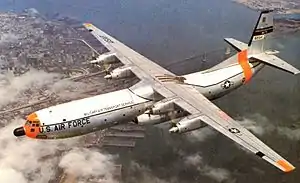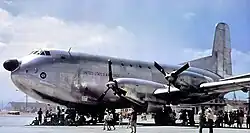| T34 Turbo-Wasp | |
|---|---|
 | |
| A B-17 Flying Fortress testbed for the T-34 turboprop engine. This aircraft was later flown on airshow circuits as the Liberty Belle.[1] | |
| Type | Turboprop |
| National origin | United States |
| Manufacturer | Pratt & Whitney |
| First run | ca. 1950 |
| Major applications | Douglas C-133 Cargomaster |
The Pratt & Whitney T34 (company designation PT2 Turbo-Wasp[2]) was an American axial flow[2] turboprop engine designed and built by Pratt & Whitney. Its only major application was on the Douglas C-133 Cargomaster.
Design and development
In 1945, the United States Navy funded the development of a turboprop engine. The T34 was produced from 1951 to 1960, but never used in U.S. Navy aircraft production.[3]
The YT34 engine with three wide-bladed propellers was made for two Navy Lockheed R7V-2 Constellation (C-121s) variants, for testing. Flight tests were on 1 September 1954.[4]
In September 1950, a testbed Boeing B-17 Flying Fortress flew with a T34 turboprop mounted in the nose of the bomber. The first application for the T34 was the Boeing YC-97J Stratofreighter, which later became the Aero Spacelines Super Guppy. The next application for the engine was the Douglas C-133 Cargomaster.[3]
Variants

- T34-P-1
- 5,700 shp (4,300 kW) equivalent.
- T34-P-2
- Similar to -1.
- T34-P-3
- 6,000 shp (4,500 kW) equivalent.
- YT34-P-5
- 5,229 shp (3,899 kW) equivalent[5]
- T34-P-6
- 5,531 shp (4,124 kW) equivalent[6]
- T34-P-7
- T34-P-7W
- 7,100 shp (5,300 kW) equivalent, w/water injection
- T34-P-9W
- 7,500 shp (5,600 kW) equivalent, w/water injection
- T34-P-12
- YT34-P-12A
- 5,500 shp (4,100 kW) equivalent[7]
- PT2F-1
- 5,500 shp (4,100 kW) equivalent, unbuilt civilian version planned to power the Lockheed L-1249B.[8]
- PT2G-3
- 5,600 shp (4,200 kW) equivalent, unbuilt civilian version planned to power the Lockheed L-1449 and possibly the L-1549.[8]
Applications

Engines on display
- T34-P-3: National Air and Space Museum[11] (NASM) in Washington, D.C.
- T34-P-6: Travis Air Force Base Heritage Center in Fairfield, California
- T34-P-7W: NASM[11]
- T34-P-7WA: Pacific Coast Air Museum (PCAM) in Santa Rosa, California
Specifications (T34-P-3)
Data from Jane's All The World's Aircraft 1961–62.[12]
General characteristics
- Type: Turboprop
- Length: 156.8 in (3,983 mm)
- Diameter: 33.75 in (857 mm)
- Dry weight: 2,590 lb (1,175 kg)
Components
- Compressor: 13-stage axial compressor
- Combustors: annular combustion chamber with eight flame tubes
- Turbine: three-stage axial-flow
- Fuel type: JP-4
- Oil system: closed circuit
Performance
- Maximum power output: 5,500 shp (4,103 kW) plus 1,252 lbf (5.57 kN) thrust, 6,000 ehp (4,476 kW) (take-off power)
- Overall pressure ratio: 6.7:1
- Power-to-weight ratio: 2.32 ehp/lb
See also
Related development
Comparable engines
Related lists
References
- ↑ warbird registry.org - B-17G/44-85734; Retrieved 6/21/11
- 1 2 Flight Global: 1952 Archive
- 1 2 Pratt&Whitney: T34 Turboprop
- ↑ Google Books: Lockheed secret projects: Inside the Skunk Works By Dennis R. Jenkins; p.28-29
- 1 2 alternatewars.com - YC-97 Characteristics Summary; Retrieved 10/12/11
- 1 2 alternatewars.com - YC-121F Charactaristics Summary; Retrieved 11/6/11
- ↑ Breffort, Dominique. Lockheed Constellation: from Excalibur to Starliner Civilian and Military Variants. Paris: Histoire and Collecions, 2006. p. 134
- 1 2 Breffort, Dominique. Lockheed Constellation: from Excalibur to Starliner Civilian and Military Variants. Histoire and Collecions, 2006. p. 113
- ↑ US War Plane: Post WWII Aircraft Engine Guide
- ↑ Breffort, Dominique. Lockheed Constellation: from Excalibur to Starliner Civilian and Military Variants. Paris: Histoire and Collecions, 2006. Print. ISBN 2-915239-62-2
- 1 2 Engine History: NASM Storage
- ↑ Taylor 1961, pp. 513–515.
- Gunston, Bill (2006). World Encyclopedia of Aero Engines, 5th Edition. Phoenix Mill, Gloucestershire, England, UK: Sutton Publishing Limited. p. 79. ISBN 0-7509-4479-X.
- Taylor, John W. R. (1961). Jane's All The World's Aircraft 1961–62. London: Sampson Low, Marston & Company.
- Breffort, Dominique (2006). Lockheed Constellation: from Excalibur to Starliner Civilian and Military Variants. Paris: Histoire and Collecions. p. 176. ISBN 2-915239-62-2.
